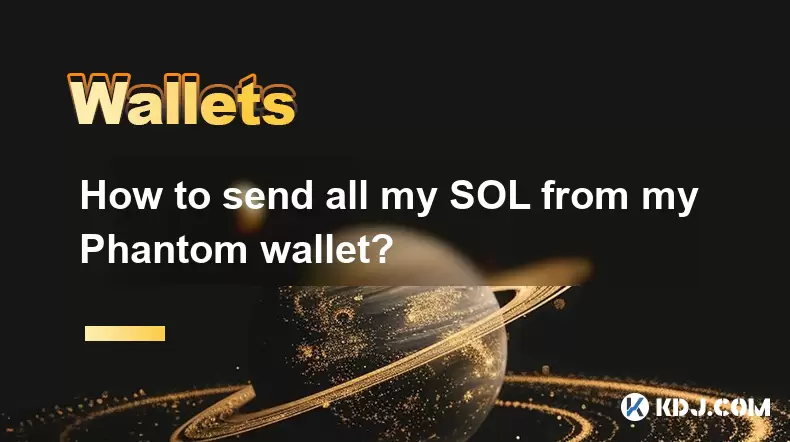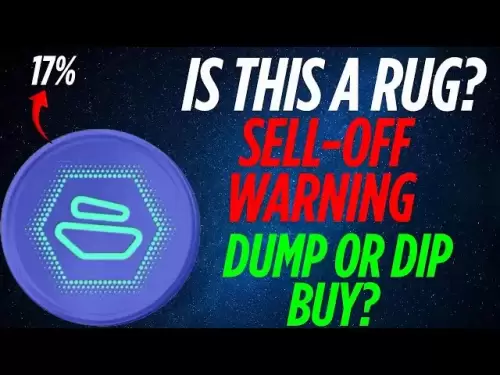-
 Bitcoin
Bitcoin $108,010.6153
-0.99% -
 Ethereum
Ethereum $2,535.1451
-1.14% -
 Tether USDt
Tether USDt $1.0002
-0.01% -
 XRP
XRP $2.2599
-0.33% -
 BNB
BNB $660.3442
-0.18% -
 Solana
Solana $149.0762
-1.43% -
 USDC
USDC $0.9999
0.00% -
 TRON
TRON $0.2866
-0.41% -
 Dogecoin
Dogecoin $0.1669
-2.73% -
 Cardano
Cardano $0.5765
-1.53% -
 Hyperliquid
Hyperliquid $38.5005
-2.98% -
 Bitcoin Cash
Bitcoin Cash $496.7709
-0.04% -
 Sui
Sui $2.8522
-2.12% -
 Chainlink
Chainlink $13.2812
-1.50% -
 UNUS SED LEO
UNUS SED LEO $9.0486
0.17% -
 Stellar
Stellar $0.2466
-2.57% -
 Avalanche
Avalanche $17.8271
-2.84% -
 Shiba Inu
Shiba Inu $0.0...01158
-1.66% -
 Toncoin
Toncoin $2.7359
-4.01% -
 Hedera
Hedera $0.1563
-1.78% -
 Litecoin
Litecoin $85.8096
-1.80% -
 Monero
Monero $313.7645
-2.86% -
 Dai
Dai $1.0002
0.02% -
 Polkadot
Polkadot $3.3494
-1.35% -
 Ethena USDe
Ethena USDe $1.0003
0.03% -
 Bitget Token
Bitget Token $4.2980
-3.40% -
 Uniswap
Uniswap $7.3906
-0.28% -
 Aave
Aave $280.1449
-2.34% -
 Pepe
Pepe $0.0...09833
-2.41% -
 Pi
Pi $0.4546
-2.21%
What are some best practices for storing private keys in Bitcoin wallets?
Hardware wallets provide the most secure Bitcoin private key storage, offering offline protection against hacking. However, always back up your recovery seed phrase securely offline and never digitally.
Mar 24, 2025 at 08:01 am

What are some best practices for storing private keys in Bitcoin wallets?
Bitcoin's security hinges entirely on the secure storage of private keys. Losing your private keys means losing access to your Bitcoin, irretrievably. Therefore, prioritizing their safety is paramount. This article details best practices for safeguarding your private keys, minimizing the risk of theft or loss.
Hardware Wallets: The Gold Standard
Hardware wallets are considered the most secure option for storing Bitcoin private keys. These physical devices isolate your keys from internet-connected computers, making them significantly less vulnerable to hacking. They offer multiple layers of security, including PIN protection and potentially passphrase encryption. Reputable manufacturers like Ledger and Trezor are widely trusted within the cryptocurrency community.
- Choose a reputable brand with a strong track record of security.
- Always update the firmware on your hardware wallet to benefit from the latest security patches.
- Back up your recovery seed phrase, but store it securely offline, separate from the device itself. Never store it digitally.
Software Wallets: Proceed with Caution
Software wallets, while convenient, are inherently more vulnerable to attacks. Malicious software on your computer could compromise your private keys. If you choose a software wallet, prioritize security best practices diligently.
- Use a reputable wallet from a well-known developer with a strong security reputation.
- Keep your operating system and software updated to patch security vulnerabilities.
- Run strong anti-virus and anti-malware software.
- Avoid using public Wi-Fi or untrusted networks to access your wallet.
Paper Wallets: A Low-Tech Solution
Paper wallets represent a simple offline storage method. Your private and public keys are printed on paper, offering a level of security against online threats. However, physical damage or loss remains a significant risk.
- Use a reputable paper wallet generator to ensure accuracy.
- Print the keys on high-quality paper and store them securely in a fireproof and waterproof safe.
- Consider multiple backups stored in separate locations.
Brainwallets: Extremely Risky
Brainwallets involve creating your keys from a passphrase you memorize. While seemingly convenient, this approach is highly discouraged due to the significant security risks involved. Guessing or cracking a passphrase is relatively easy compared to brute-forcing cryptographic keys.
Multi-Signature Wallets: Enhanced Security
Multi-signature wallets require multiple private keys to authorize a transaction. This adds an extra layer of security, as losing one key doesn't necessarily mean losing access to your funds. It’s a robust option for high-value holdings. However, careful coordination is required among the key holders.
Seed Phrase Management: Utmost Importance
The recovery seed phrase is crucial. It’s the master key to your Bitcoin. Losing it means irreversible loss of access to your funds. Protecting it is paramount.
- Write it down neatly by hand, never type it.
- Store it offline, in a physically secure location. Consider a safety deposit box or a fireproof safe.
- Use a durable, tamper-evident container to protect it.
- Never share your seed phrase with anyone, regardless of their claims.
Regular Security Audits:
Regardless of your chosen storage method, conducting regular security audits is essential. Review your security practices periodically to identify and address any vulnerabilities. This might involve reviewing your software, hardware, and physical security measures.
Choosing the Right Wallet Type:
The best wallet type depends on your individual needs and technical proficiency. Hardware wallets offer the strongest security but may have a steeper learning curve. Software wallets are more convenient but require diligent security practices. Paper wallets offer a balance but are vulnerable to physical damage.
Understanding the Risks:
Every storage method carries inherent risks. Hardware wallets can be lost or stolen. Software wallets can be compromised by malware. Paper wallets can be destroyed. Understanding these risks and implementing appropriate countermeasures is key to secure Bitcoin storage.
Frequently Asked Questions:
Q: What is a private key, and why is it so important?
A: A private key is a secret code that allows you to spend your Bitcoin. Without it, you cannot access or transfer your funds. It's the foundation of Bitcoin's security.
Q: What happens if I lose my private keys?
A: Losing your private keys means losing your Bitcoin permanently. There's no way to recover them, and your funds will be inaccessible.
Q: Are hardware wallets completely secure?
A: While hardware wallets offer a high level of security, they are not invulnerable. They can be physically lost or stolen, and though rare, vulnerabilities can exist in their firmware.
Q: How often should I back up my seed phrase?
A: It's recommended to back up your seed phrase immediately upon receiving it and then create additional backups at regular intervals, storing them in separate, secure locations.
Q: Is it safe to store my seed phrase digitally?
A: No, storing your seed phrase digitally is extremely risky. Your computer or cloud storage could be compromised, leading to the theft of your Bitcoin.
Q: What is a multi-signature wallet, and how does it work?
A: A multi-signature wallet requires multiple private keys to authorize a transaction. This adds an extra layer of security, making it harder for thieves to gain access to your funds.
Q: What if my hardware wallet malfunctions?
A: Reputable manufacturers offer support and recovery options. Your recovery seed phrase is paramount in restoring access to your funds in such a scenario. Always follow the manufacturer's instructions for troubleshooting.
Q: Can I use the same password for multiple wallets?
A: Absolutely not. Using the same password across multiple wallets significantly weakens your security. If one wallet is compromised, all others using the same password are at risk.
Q: How do I choose a reputable hardware wallet?
A: Research thoroughly. Look for brands with established reputations, open-source firmware (where possible), and a strong community following. Read reviews and compare features before making a decision.
Disclaimer:info@kdj.com
The information provided is not trading advice. kdj.com does not assume any responsibility for any investments made based on the information provided in this article. Cryptocurrencies are highly volatile and it is highly recommended that you invest with caution after thorough research!
If you believe that the content used on this website infringes your copyright, please contact us immediately (info@kdj.com) and we will delete it promptly.
- Ethereum, Exchanges, and Price Resilience: Navigating the Crypto Landscape
- 2025-07-08 08:30:13
- Bitcoin's NVT Golden Cross: Is a Local Top Brewing?
- 2025-07-08 09:10:11
- Semler Scientific's Bitcoin Bonanza: A Cryptocurrency Goal?
- 2025-07-08 09:10:11
- From Coin Flips to Cityscapes: How Names, Parks, and Planting Shaped St. Albert
- 2025-07-08 08:50:12
- Candles, Laundromats, and Inspiration: A Surprising New York Story
- 2025-07-08 09:15:11
- Iron Maiden Rocks the Royal Mint: A 50th Anniversary Coin That Kicks Ass
- 2025-07-08 09:15:11
Related knowledge

How to cancel a pending transaction in Phantom wallet?
Jul 03,2025 at 07:21pm
Understanding Pending Transactions in Phantom WalletA pending transaction in the Phantom wallet occurs when a user initiates a transfer or interaction with the Solana blockchain, but it hasn't yet been confirmed by the network. This can happen due to various reasons such as low transaction fees, network congestion, or incorrect gas settings. It's import...

How to see the estimated value of my tokens in Phantom wallet?
Jul 04,2025 at 12:21am
What is Phantom Wallet?Phantom wallet is one of the most popular cryptocurrency wallets designed for the Solana blockchain. It allows users to store, send, receive, and manage various tokens built on Solana, including SPL tokens and NFTs. The wallet offers a user-friendly interface, making it accessible for both beginners and advanced users in the crypt...

How to lock my Phantom wallet extension?
Jul 03,2025 at 11:14am
What Is the Phantom Wallet and Why Lock It?The Phantom wallet is a popular non-custodial cryptocurrency wallet designed for interacting with the Solana blockchain. Supporting both browser extensions and mobile apps, Phantom allows users to store, send, receive, and stake SOL tokens, as well as interact with decentralized applications (dApps). Securing y...

Does Phantom wallet offer two-factor authentication (2FA)?
Jul 03,2025 at 09:00am
Understanding Phantom Wallet and Its Security FeaturesPhantom wallet is a widely used non-custodial cryptocurrency wallet that supports the Solana blockchain. It allows users to store, send, receive, and interact with decentralized applications (dApps) seamlessly. As security is a top priority for any crypto wallet user, security features like two-facto...

How to send all my SOL from my Phantom wallet?
Jul 06,2025 at 10:00am
Preparing to Send SOL from Your Phantom WalletBefore initiating any transaction, it is crucial to ensure that your Phantom wallet is fully set up and connected to the correct network. Phantom supports multiple networks, but for sending SOL, you must be on the Solana blockchain. Confirm this by checking the network indicator in the top-right corner of th...

What is "rent" on Solana and how does it affect my Phantom wallet?
Jul 02,2025 at 08:35pm
Understanding 'Rent' on SolanaIn the context of Solana, the term 'rent' refers to a storage fee that users pay for maintaining data on the blockchain. Unlike Ethereum, where storage costs are paid once via gas fees during contract deployment, Solana implements a recurring cost model to ensure efficient usage of network resources. This means that any acc...

How to cancel a pending transaction in Phantom wallet?
Jul 03,2025 at 07:21pm
Understanding Pending Transactions in Phantom WalletA pending transaction in the Phantom wallet occurs when a user initiates a transfer or interaction with the Solana blockchain, but it hasn't yet been confirmed by the network. This can happen due to various reasons such as low transaction fees, network congestion, or incorrect gas settings. It's import...

How to see the estimated value of my tokens in Phantom wallet?
Jul 04,2025 at 12:21am
What is Phantom Wallet?Phantom wallet is one of the most popular cryptocurrency wallets designed for the Solana blockchain. It allows users to store, send, receive, and manage various tokens built on Solana, including SPL tokens and NFTs. The wallet offers a user-friendly interface, making it accessible for both beginners and advanced users in the crypt...

How to lock my Phantom wallet extension?
Jul 03,2025 at 11:14am
What Is the Phantom Wallet and Why Lock It?The Phantom wallet is a popular non-custodial cryptocurrency wallet designed for interacting with the Solana blockchain. Supporting both browser extensions and mobile apps, Phantom allows users to store, send, receive, and stake SOL tokens, as well as interact with decentralized applications (dApps). Securing y...

Does Phantom wallet offer two-factor authentication (2FA)?
Jul 03,2025 at 09:00am
Understanding Phantom Wallet and Its Security FeaturesPhantom wallet is a widely used non-custodial cryptocurrency wallet that supports the Solana blockchain. It allows users to store, send, receive, and interact with decentralized applications (dApps) seamlessly. As security is a top priority for any crypto wallet user, security features like two-facto...

How to send all my SOL from my Phantom wallet?
Jul 06,2025 at 10:00am
Preparing to Send SOL from Your Phantom WalletBefore initiating any transaction, it is crucial to ensure that your Phantom wallet is fully set up and connected to the correct network. Phantom supports multiple networks, but for sending SOL, you must be on the Solana blockchain. Confirm this by checking the network indicator in the top-right corner of th...

What is "rent" on Solana and how does it affect my Phantom wallet?
Jul 02,2025 at 08:35pm
Understanding 'Rent' on SolanaIn the context of Solana, the term 'rent' refers to a storage fee that users pay for maintaining data on the blockchain. Unlike Ethereum, where storage costs are paid once via gas fees during contract deployment, Solana implements a recurring cost model to ensure efficient usage of network resources. This means that any acc...
See all articles

























































































